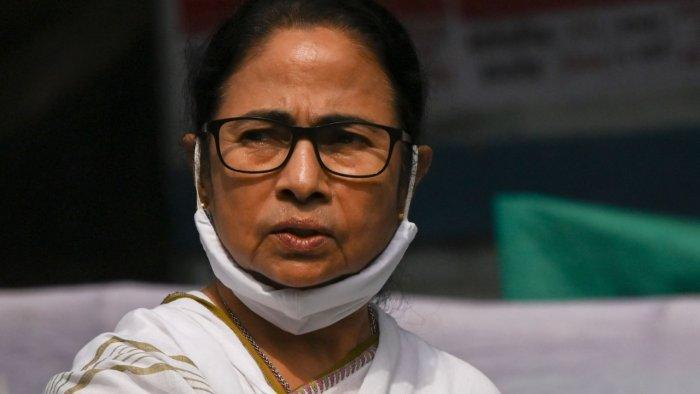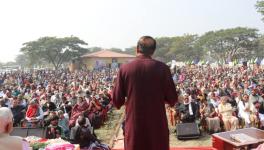West Bengal: Mamata Gung-ho After BGBS Meet, Opposition Questions Lack of Progress on Past Projects

Image Courtesy: AFP
Kolkata: West Bengal chief minister (CM) Mamata Banerjee's desperation to enlist the cooperation of industrialists has been evident in her recent statements. Banerjee even announced her decision to hold the seventh edition of the Bengal Global Business Summit (BGBS) on February 1-3, 2023- just nine months after the sixth edition on April 20-21, 2022. The next BGBS will be a three-day event instead of the usual two-day schedule.
Secondly, Banerjee wants New Delhi to see that investigative agencies "do not disturb" industrialists. For conveying this to the Union government, she sought the good offices of state Governor Jagdeep Dhankhar, who was present at the inauguration event on April 20. Banerjee and her party Trinamool Congress (TMC) always accuse Dhankhar of acting more like a "BJP person than as a governor."
Thirdly, she has assured industrialists that they would not experience a loss of workdays in West Bengal, hinting that trade union action will not be tolerated even for genuine reasons.
With 137 MoUs and LoIs signed and investment proposals computed at Rs 3,42,375 crore, in her valedictory speech, Banerjee described the sixth edition of BGBS as the "most successful summit held under her watch."
The value of investment proposals received at the preceding five editions held from 2015 to 2019 added over Rs 12 lakh crore. Because of COVID-19, it could not be held for two years- 2020 and 2021. Banerjee did not enlighten participants at the latest BGBS on the progress of the old proposals. It is difficult to recount how many, if at all, employment-generating manufacturing ventures have gone on stream/inaugurated during the 11-year TMC rule.
As for the Rs 3.42 lakh crore value of signed MoUs/LoIs, over which Banerjee is gung-ho, it bears mention that the value is quite on the high side when judged by the figures of each of the previous five BGBS editions because of the telling impact of inflation on the economy; much of it due to petro-product prices.
Among the proposals received this time around, those for the health and education sectors deserve mention. The health sector proposals include augmentation of a number of beds and up-gradation of treatment facilities by major corporate hospitals and setting up of a health university by the JIS Group, which is present in the state's education segment. The promoters have indicated an investment of Rs 4,500 crore.
In education, a world-class university at Kolkata may be mentioned for research on frontier technologies, such as quantum computing and sustainable energy. This has been proposed by NRI Purnendu Chatterjee, who, at the behest of Jyoti Basu, had co-promoted Haldia Petrochemicals Ltd with West Bengal Industrial Development Corporation and of which The Chatterjee Group (TCG) is now the controlling promoter. As a preparatory initiative, TCG has already started a research centre called TCG Crest in Salt Lake, where PhD scholars are working on cutting-edge technologies.
The education segment proposals also include setting up an engineering, medical and management campus by the Manipal Group and training of high school teachers by Microsoft. The other mention-worthy proposals are: MoU between Poland and West Bengal Power Development Corporation Ltd about the Deocha-Pachami coal project, an MoU for the development of water transport in the backward Sundarbans between The Netherlands and the state transport department, proposal for making electricity-driven buses in Murshidabad district and offer by Kolkata headquartered, cash-rich ITC to set up a personal care product making unit. This will be their 20th unit in West Bengal.
The Sajjan Jindal Group, which ex-CM Buddhadev Bhattacharjee had roped in for a major integrated steel venture, has established its presence in the cement industry at Salboni in Paschim Medinipur (because of unresolved uncertainty over iron ore from Odisha, it could not proceed with the steel project). This group has now proposed investments in a 900 MW hydro-pumped storage unit, rolls for steel plants, a Bengal museum and a big temple at Mayapur – this smacks of novelty. The Niranjan Hiranandani Group has proposed Rs 1,500 crore investments in a data centre and a warehousing park. West Bengal State Electricity Distribution Company Ltd has inked an MoU with KfW of Germany for a floating solar power facility. There are many other schemes.
In the recently-concluded BGBS, the limelight was hogged by the Adani Group of Gujarat, represented by group-supremo Gautam Adani and his son Karan. The spotlight on senior Adani was expected, with Mukesh Ambani, who had made it to some of the earlier BGBS editions, not making it this time around. Senior Adani addressed Banerjee as 'Didi', and the CM's gesture was reflected in her photographs with the father and the son.
The group's involvement with West Bengal already has had a soft start with projects in port, gas distribution and the acquisition of a closed rice mill in Purba Bardhaman district. At the business meet, the Adanis announced their intention to invest Rs 10,000 crore over a decade – an average of Rs 1,000 crore a year. The investment is likely to materialise in the sectors in which the group has a strong presence.
No wonder, therefore, there is intense interest in industry circles currently on the West Bengal government's decision to award the contract for the Tajpur deep-sea port venture in east Medinipur district, for which the Adanis have emerged as the highest bidder (there were only two; the other being the Sajjan Jindal group ). A decision is likely soon, given that the CM said, "Everything is ready in this regard." Should the Adanis get the port project, it will mark their involvement in the state.
Banerjee's high voltage claims about the proposals, whose execution she said would create 40 lakh jobs, drew flak from the Opposition. Well-known economist Dr Ashok Lahiri, who is now a BJP MLA in the state, said many workers from West Bengal regularly move out to other states in search of livelihood and get better wages there.
Lahiri asked, "If opportunities existed in West Bengal, would this happen? Availability of infrastructure, conducive business environment and administrative transparency facilitate investments. Investors are not swayed by sentiment; they see scope for earning profit."
BJP vice-president Dilip Ghosh said Banerjee is only seen inaugurating Durga Pujas and Kali Pujas, not any industrial unit.
CPM leader Sujan Chakravarty pointed out, "Five editions of BGBS had been held from 2015 to 2019; let the chief minister name five large factories, the gates of which she had ceremonially opened."
Citing the state government's State of Environment Report 2021, Chakravarty said that the number of industrial units had dropped to 39,359 from 60,900 in 2016. The number of large industries had declined to 1066 from 1337.
Leader of Opposition in Lok Sabha and West Bengal Congress chief Adhir Ranjan Chowdhury said, "After each BGBS edition, CM announces investment commitments made by industrialists. Nothing happens after that; it's all on paper. It's all in advertisements. If the claimed commitments were translated into reality, we would not have been witness to the misery and devastation of thousands and thousands of migrant labour from our state during the COVID phase."
Get the latest reports & analysis with people's perspective on Protests, movements & deep analytical videos, discussions of the current affairs in your Telegram app. Subscribe to NewsClick's Telegram channel & get Real-Time updates on stories, as they get published on our website.
























